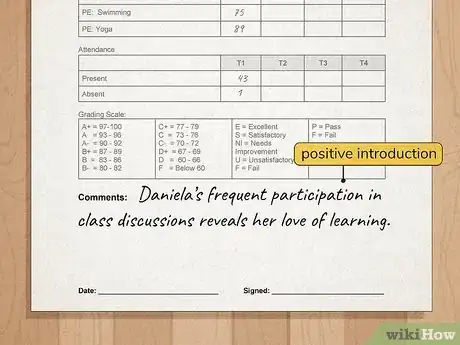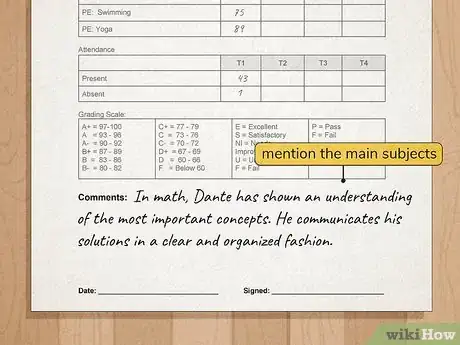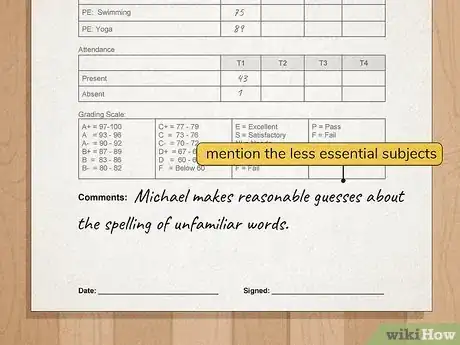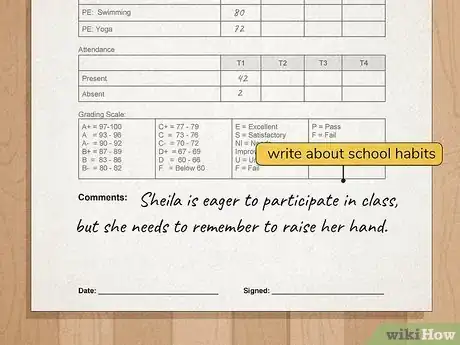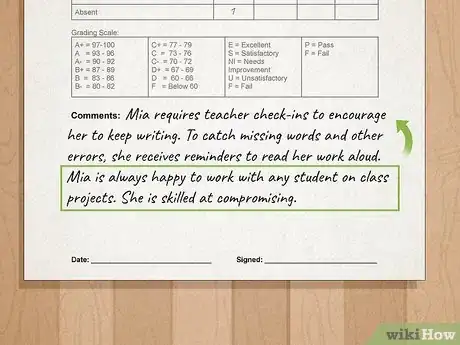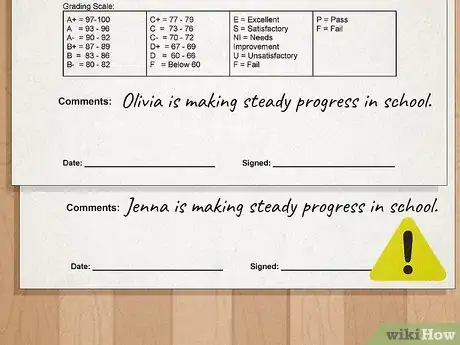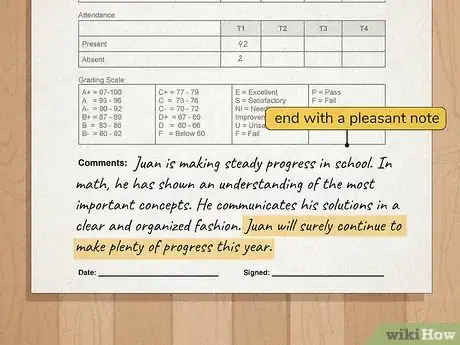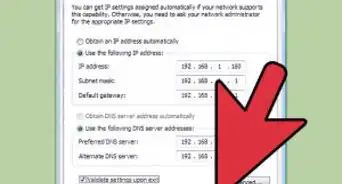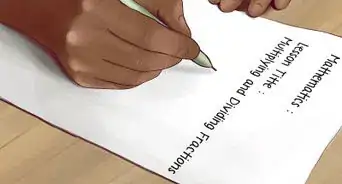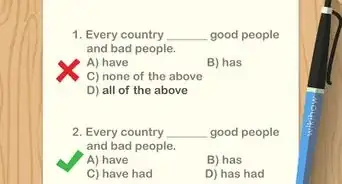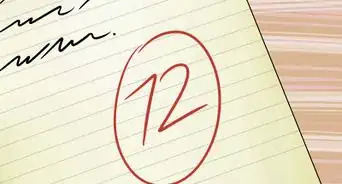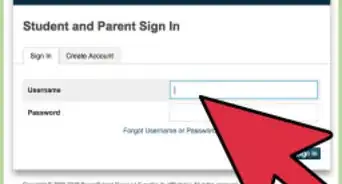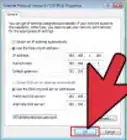X
wikiHow is a “wiki,” similar to Wikipedia, which means that many of our articles are co-written by multiple authors. To create this article, volunteer authors worked to edit and improve it over time.
This article has been viewed 25,757 times.
Learn more...
Writing report card comments is a big project, and it can seem overwhelming at first. But taking this project one step at a time lets you break it into manageable pieces. In the end, you’ll proudly send home report cards that thoughtfully show parents how their children are doing in school and what goals you have in mind.
Steps
-
1Start each report card comment with a positive introduction. One or two sentences should do the job. A positive introduction boosts the parents’ mood, making the rest of the comment easier to swallow. It’s possible to write a positive comment even for a student who is struggling. Here are some examples of introductions:
- Olivia is making steady progress in school.
- Juan is always happy to work with any student on class projects. He is skilled at compromising.
- Daniela’s frequent participation in class discussions reveals her love of learning.
-
2Write about the student’s performance in reading, writing, and math. These are the big subjects students spend the most class time on. One to three sentences per subject should be enough. Below are some examples.
- Elijah receives extra help to improve his reading comprehension. While reading, he should periodically pause to summarize what he has read and reread when necessary. Elijah reads text with appropriate speed and accuracy.
- Mia can write a basic story that has a character and plot. She requires teacher check-ins to encourage her to keep writing. To catch missing words and other errors, Mia receives reminders to read her work aloud.
- In math, Dante has shown an understanding of the most important concepts. He communicates his solutions in a clear and organized fashion.
Advertisement -
3Consider writing about spelling, social studies, and science. These subjects are less essential to comment on, since students spend less class time on them. Examples of sentences about these subjects:
- Michael makes reasonable guesses about the spelling of unfamiliar words.
- While learning about our government, Lilly has demonstrated an understanding of the concepts.
- In science, Sofia has successfully carried out experiments while recording data and drawing solid conclusions.
-
4Write about school habits, especially when they are in need of improvement or have improved. Consider including a positive twist on a problem, such as “Sheila is eager to participate in class, but she needs to remember to raise her hand.” Areas to consider mentioning are:
- Focusing on the teacher
- Focusing on work
- Cooperating and resolving conflicts with classmates
- Complying with the teacher
- Following rules
- Raising his/her hand instead of calling out
- Participating by asking and answering questions
- Speaking loudly enough
- Accepting advice from the teacher
- Seeking help (neither too often nor too infrequently)
- Persevering
- Transitioning from one activity to another
- Organization of materials
- Handwriting
- Quality of homework
- Remembering to bring homework to school
- Attendance (absences and tardiness)
-
5Consider re-ordering the sentences of each student’s report card comment so the more positive parts are at the beginning. This boosts the mood of the parents and lets them know you are on the child’s side. The negative parts of the report card will then be easier for them to digest.
-
6Copy and paste from one student’s comment to another with caution. After writing the report card comments for the first few students, you can save time by copying and pasting sentences to get the rest of the report cards done quickly. But take these precautions:
- After pasting a sentence into another student’s comment, remember to change the name and pronouns.
- Don’t get too carried away with copy and paste. A parent of twins will compare the two report cards. Parents who are friends might also compare report cards. If the two report cards are identical except for the names, parents could feel you didn’t put much thought into the comments and might feel the comments are not accurate.
-
7Conclude the report card comment with a pleasant sounding sentence. An example is, “Elizabeth will surely continue to make plenty of progress this year.”
-
8For a student who works with special education teachers or other staff members, run your comment past them. That way, you’ll all be on the same page with what you are communicating to parents. In addition, those staff members might suggest you include something that they’ve noticed about the child, but that you haven’t.
-
9Ask a colleague or your principal to look at comments that convey big problems. These professionals may offer you feedback that will help you soften the language while still getting your point across.
-
10Proofread. Fix spelling, punctuation, capitalization, grammar, and unclear language. Check that you’ve used the right name and pronouns in each report card. The wrong pronoun can make the parent wonder whether you accidentally described a different child; the wrong name, which can result from copying and pasting, is a breach of confidentiality. An error-free report card comment will demonstrate that you put plenty of time and thought into the report card.
-
11If a report card mentions a big problem that the parents don’t already know about, call or meet with them before the report card goes home. The news will sit better with them when they hear your caring tone of voice. The conversation will also let them ask questions for clarification. Parents who are shocked by a report card may complain to the principal. A call or meeting will save you from that headache!
Advertisement
About This Article
Advertisement
